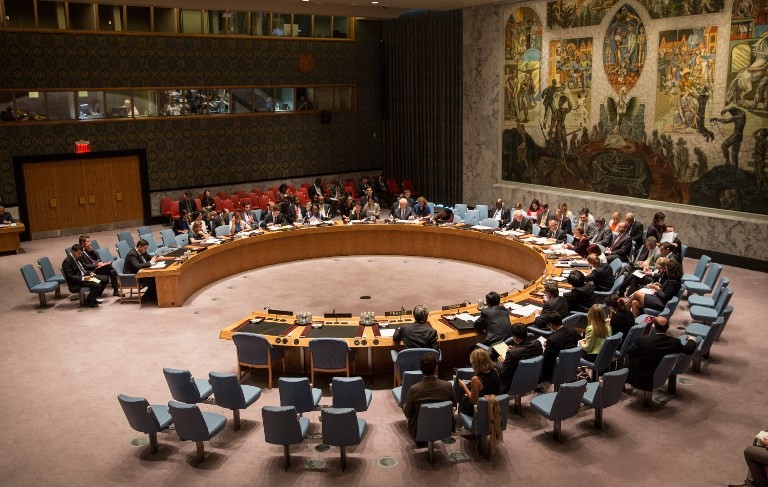Popular Reads
Top Results
Can't find what you're looking for?
View all search resultsPopular Reads
Top Results
Can't find what you're looking for?
View all search resultsMiddle powers must step up global role
Speaking to The Jakarta Post during the opening session of the webinar series titled “Multilateralism during a pandemic: Indonesia’s Perspective” on Thursday, Foreign Minister Retno LP Marsudi said countries around the world needed to make concerted efforts to promote multilateralism, which is now under threat from what she called transactional politics in international relations and growing self-reliance in dealing with the coronavirus.
Change text size
Gift Premium Articles
to Anyone
A
s more countries shut their borders to prevent the spread of COVID-19 and while major powers step up their rivalries, especially over access to potential vaccines and other critical medical supplies, Indonesia has renewed a call for countries around the world, especially those regarded as middle powers, to bolster existing platforms for multilateralism.
Speaking to The Jakarta Post during the opening session of the webinar series titled “Multilateralism during a pandemic: Indonesia’s Perspective” on Thursday, Foreign Minister Retno LP Marsudi said countries around the world needed to make concerted efforts to promote multilateralism, which is now under threat from what she called transactional politics in international relations and growing self-reliance in dealing with the coronavirus.
“Indonesia continues to believe in the virtue of multilateralism. We will continue to enforce an active and free foreign policy by not allowing ourselves to take sides in the big power rivalries,” Retno said. The minister also expected that the current assault on multilateralism would be a temporary phenomenon and that before long countries could go back to promoting global cooperation.
“Countries tend to close their doors to foreigners, which is very well understood during this pandemic. But hopefully this kind of attitude will only last temporarily. We need to build trust on global governance especially during this specific time,” Retno said.
The country's top diplomat said that as major powers like the United States and China showed little interest in working together to tackle the global health crisis, Indonesia and a handful of other countries had drafted a United Nations General Assembly resolution in March calling for a multilateral approach to respond to the coronavirus.
Retno added that the frustration regarding big power rivalries during the pandemic could in fact be an impetus for enacting reform within international organizations including the UN, spearheaded by developing countries.
Australian Ambassador to Indonesia Gary Quinlan backed Retno's proposal, urging middle powers like Australia and Indonesia to forge a new kind of cooperation on the issue of public health and the economy.
“The traditional leadership that we’ve come to expect is kind of disappearing. It means the rest of us, Indonesia, Australia and other middle powers need to step up and fill that gap,” he said, adding that middle powers must show courage and leadership to deal with the existing global political hierarchy.
Quinlan maintained that history had shown that middle power countries had played crucial roles in keeping multilateralism alive. The fact that institutions like the G20, whose members consist of emerging economic countries and account for 85 percent of the world economy, could rise to prominence to respond to the 2008 global financial crisis showed how much coordination and multilateral cooperation between middle powers was necessary, Quinlan said.
“We need some people in the driving seat, we need to reinforce all of those institutions,” he said.
Executive director of the Centre for Strategic and International Studies (CSIS) Phillips J. Vermonte meanwhile proposed the need for a global platform that could work to accommodate the world’s vulnerable, especially in dealing with the global health crisis arising from the COVID-19 pandemic.
“Nations and international forums must keep nationalism and protectionism at bay. All countries need to address the international framework on global health issues and embark on the framework of the international health regulations,” he said.
United Nations interim resident coordinator for Indonesia Niels Scott said that while the world arrived at the crucial stage in the pandemic and needed to decide on equitable distribution of vaccines worldwide, "we can’t fail multilateralism at this point, so that we can recover stronger.”
While Indonesia has chosen to partner with Sinovac Biotech of China, Genexine Inc. of South Korea and the Bill Gates-backed Coalition for Epidemic Preparedness Innovations (CEPI) in the search for a vaccine, fears over bulk-buying and inequitable global distribution of vaccines among wealthier countries remain a major concern in the country.
Also speaking during the webinar was the head of the Foreign Ministry’s Policy Analysis And Development Agency, Siswo Pramono, who expressed his optimism that in the wake of this pandemic, a new generation of leader would emerge and take up the mantle of multilateralism.
“We are going to see a new kind of multilateralism coming. Unlike the older generations who had been exposed to open war, millennials such as the current diplomats have long been dealing with pandemics such as HIV-AIDS in the 1980s, SARS, MERS and now COVID-19,” he said.
Siswo said with millennials in charge of efforts to reanimate the economy, which has been battered by COVID-19, they would provide a different geopolitical perspective and a more cosmopolitan view of the world.
"So, the pandemic is the real threat for millennials and 40 percent of diplomats are now millennials. They might have different points of view with those of the previous generation," he said.










